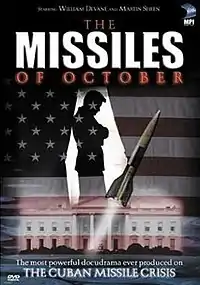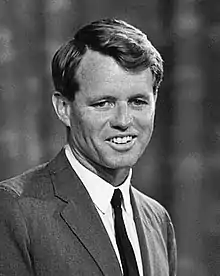The Missiles of October
The Missiles of October is a 1974 docudrama made-for-television play about the Cuban Missile Crisis. The title evokes the 1962 book The Guns of August by Barbara Tuchman about the missteps amongst the great powers and the failed chances to give an opponent a graceful way out, which led to the First World War. The teleplay introduced William Devane as President John F. Kennedy and cast Martin Sheen as United States Attorney General Robert F. Kennedy. The script is based on Robert Kennedy's posthumously published 1969 book Thirteen Days: A Memoir of the Cuban Missile Crisis.
| The Missiles of October | |
|---|---|
 DVD cover for the film | |
| Genre | Docudrama |
| Written by | Stanley R. Greenberg |
| Directed by | Anthony Page |
| Starring | William Devane Martin Sheen Howard Da Silva Ralph Bellamy |
| Theme music composer | Laurence Rosenthal |
| Country of origin | U.S. |
| Original language | English |
| Production | |
| Executive producer | Irv Wilson |
| Producers | Robert Berger Herbert Brodkin |
| Editor | Jerry Greene |
| Running time | 150 mins |
| Production companies | Maljack Productions Viacom Productions |
| Distributor | CBS Television Distribution |
| Release | |
| Original network | ABC |
| Original release | 18 December 1974 |
Production notes
The title of the play was influenced by the 1962 book The Guns of August by Barbara W. Tuchman, which describes various events leading to World War I; and, which had been read by President Kennedy shortly before the crisis.[1] In the play, Kennedy compares events in the book to the crisis with the Soviet Union.
Staged as a two and a half hour television play, the production eschews physical action and detailed sets and wardrobes, in favor of emphasis on dialogue, emotion, and decision making. It depicts how the world came close to the brink of, and eventually stepped away from global thermonuclear war, highlighting the roles of President John F Kennedy, Attorney General Robert F. Kennedy, Premier Nikita Khrushchev, U.S. Ambassador to the United Nations Adlai Stevenson, and former Secretary of State Dean Acheson in the crisis.
The Missiles of October gave the US general public its first look behind the scenes at the inner workings, disagreements, and ultimate consensus of Kennedy's administration to blockade Cuba, rather than attempt to invade to dislodge the just-discovered, only partially completed Soviet nuclear missile emplacements in Cuba. It details US attempts to give the Soviets room to negotiate without appearing to capitulate, and also periodically depicts Khrushchev reporting progress of the events to his Communist Party cohorts.
Kennedy's Vice-President Lyndon B. Johnson, who was a member of EXCOMM, and was present at most meetings during the crisis, does not appear in the docudrama.
The play was directed by Anthony Page with writing credits given to Stanley R. Greenberg and Robert Kennedy.
Cast
- William Devane as John F. Kennedy, President of the United States
- Martin Sheen as Robert F. Kennedy, Attorney General of the United States
- Howard Da Silva as Nikita Khrushchev, Premier of the Soviet Union
- Ralph Bellamy as Adlai Stevenson, U.S. Ambassador to the United Nations
- Michael Lerner as Pierre Salinger, White House Press Secretary
- Clifford David as Theodore Sorensen, White House Counsel
- John Dehner as Dean Acheson, former U.S. Secretary of State
- Nehemiah Persoff as Andrei Gromyko, Soviet Foreign Minister
- Albert Paulsen as Anatoly Dobrynin, Soviet Ambassador to the United States
- Will Kuluva as Valerian Zorin, Soviet Diplomat
- Dana Elcar as Robert McNamara, United States Secretary of Defense
- Larry Gates as Dean Rusk, United States Secretary of State
- William Prince as C. Douglas Dillon, U.S. Secretary of the Treasury
- Keene Curtis as John McCone, Director of the CIA
- James Olson as McGeorge Bundy, U.S. National Security Advisor
- Andrew Duggan as General Maxwell Taylor, Chairman of the Joint Chiefs of Staff
- Robert P. Lieb as Curtis LeMay, Chief of Staff of the USAF
- Richard Eastham as David M. Shoup, Commandant of the Marine Corps
- Dennis Patrick as Llewellyn Thompson, Former U.S. Ambassador to the Soviet Union
- Kenneth Tobey as George W. Anderson Jr., Chief of Naval Operations
- James Hong as U Thant, U.N. Secretary General
- John Randolph as George Ball, Undersecretary of State
- Wright King as Richard Russell Jr., Senator
- Byron Morrow as J. William Fulbright, Senator
- Francis De Sales (actor) as unnamed Republican Senator
- Arthur Franz as Charles A. Halleck, Congressman
- Ron Feinberg as Charles de Gaulle, French President
- Paul Lambert as John A. Scali, ABC News Correspondent
- Doreen Lang as Evelyn Lincoln, President Kennedy's personal secretary
- Harris Yulin as Alexander Fomin, KGB spy
- Stewart Moss as Kenneth O'Donnell, Special Assistant to the President
- James T. Callahan as David Powers, Special Assistant to the President
- Peter Donat as David Ormsby-Gore, British Ambassador to the United States
- Ted Hartley as unnamed Air Force Major General
- Stacy Keach Sr. as William E. Knox, President of Westinghouse Electric International
- John McMurtry as Russian poet Yevgeny Yevtushenko
- Thayer David as uncredited narrator
Awards
Technical Director Ernie Buttelman won the 1975 Emmy Award for outstanding achievement. There were several other Emmy nominations, including outstanding drama or comedy special; outstanding supporting actor in a comedy or drama special for Ralph Bellamy; and outstanding writing in an original teleplay for Greenberg. That same year Greenberg won the Humanitas Prize in the 90-minute category.
In 1997 the play won a Producers Guild of America Hall of Fame award.
See also
- Thirteen Days (book), memoirs of the crisis by Robert Kennedy
- Thirteen Days (film), a 2000 retelling of the story with newly declassified information not available in 1974
- Cultural depictions of John F. Kennedy
References
- Hindley, Meredith. "The Dramatist". National Endowment for the Humanities (NEH). Retrieved 2 May 2019.
